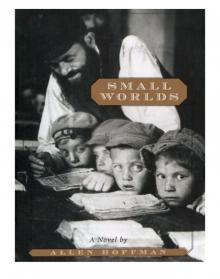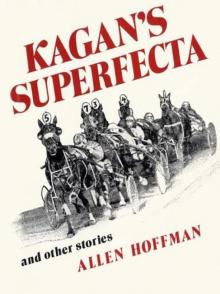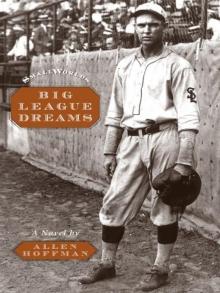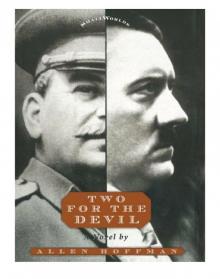- Home
- Allen Hoffman
Big League Dreams (Small Worlds)
Big League Dreams (Small Worlds) Read online
Table of Contents
Title Page
Dedication
THE BRIDGE
ST. LOUIS, MISSOURI 1920
SAINTS AND REBBES
CHAPTER ONE
CHAPTER TWO
CHAPTER THREE
CHAPTER FOUR
CHAPTER FIVE
CHAPTER SIX
CHAPTER SEVEN
CHAPTER EIGHT
CHAPTER NINE
CHAPTER TEN
CHAPTER ELEVEN
CHAPTER TWELVE
CHAPTER THIRTEEN
CHAPTER FOURTEEN
CHAPTER FIFTEEN
CHAPTER SIXTEEN
CHAPTER SEVENTEEN
CHAPTER EIGHTEEN
CHAPTER NINETEEN
CHAPTER TWENTY
CHAPTER TWENTY-ONE
CHAPTER TWENTY-TWO
CHAPTER TWENTY-THREE
CHAPTER TWENTY-FOUR
CHAPTER TWENTY-FIVE
CHAPTER TWENTY-SIX
CHAPTER TWENTY-SEVEN
CHAPTER TWENTY-EIGHT
CHAPTER TWENTY-NINE
CHAPTER THIRTY
CHAPTER THIRTY-ONE
CHAPTER THIRTY-TWO
CHAPTER THIRTY-THREE
CHAPTER THIRTY-FOUR
CHAPTER THIRTY-FIVE
CHAPTER THIRTY-SIX
THE LETTER
ABOUT THE AUTHOR
Acclaim for Small Worlds by Allen Hoffman
Copyright Page
We hope you enjoy this book from Abbeville Press. To write to the author or see our other titles, click here. (This link will open your device’s web browser.)
JACKET FRONT: “Hank Severeid.” The Sporting News, St. Louis, Missouri.
For Avi, Nehama, Ellie, and Atara
THE BRIDGE
CROSSING THE RIVER NEDD AS HE DEPARTED KRIMSK, the rebbe had the visionary experience of treading in the footsteps of Napoleon. Looking down at the water, he saw a cloud reflected as a pyramid and knew that Napoleon had crossed the river like a modern, steadfast pharaoh. The knowledge that he was emulating mighty pharaoh gave the rebbe confidence that he was traveling in the correct direction, for he understood that Israel’s post-Temple exile had not gone far enough. To ensure that it would, the Krimsker Rebbe, Yaakov Moshe Finebaum, wanted to imitate the Shekinah, the glory of God’s presence, by burying himself in the depths of exile and thus spreading the messianic redemption. On the throbbing steamship that crossed the Atlantic Ocean to the demonic Other Side, presentiments of diaspora impurity encouraged him.
A glance at the map told the rebbe that the city in which previous Krimsker immigrants had settled—and promised help—was the correct place. St. Louis, buried in the middle of the continent, sat astride a river. These similarities with the old home comforted him and held the promise of a new Krimsk. In contrast to the simple Nedd, the new river had such an astonishing name, the Mississippi. On the train west, the rebbe eagerly anticipated crossing the Mississippi, in the belief that this initial encounter would inspire the same prophetic talents that his departure from Krimsk had.
Repeated inquiries elicited the response from the conductor that the train was on schedule and would approach the river at sunset. To the rebbe’s surprise, they did not get off the train. The train itself began to climb onto a massive masonry and iron bridge, which carried it across the river. And the river? Yaakov Moshe rushed to the window, leaning close to the pane, to examine the Mississippi in mystic intimacy, but the Eads Bridge was so high that he could barely see the barges floating impossibly far below. The river, like an ocean, stretched away as far as the eye could see. The rebbe ran across the car to the window on the opposite side, and the Mississippi stretched away even farther and grander. Suddenly he realized that the seemingly small chains of barges lost on its mammoth surface could hold all of Krimsk, Krimichak, and the pond in between. Seeing his terrified amazement, the conductor came over to announce with unbounded American pride that the American Mississippi River is greater than the Nile in ancient Egypt.
The rebbe turned back to the unbelievable sight. In the interim the setting sun had shifted slightly, and the great majestic Mississippi reflected the red dying rays; the rebbe gazed upon a boundless stream of blood like pharaoh’s lesser Nile during the ferocious first plague. Yaakov Moshe turned away from the window and fell into his coach seat.
Reb Zelig, clutching the Torah, leaned toward him to ask if they should recite the blessing upon seeing a wonder of nature. The rebbe leaned forward and kissed the holy scroll’s blue velvet cover, which was the color of real life-giving water and not the bloody life-depleting crimson that drained a continent through the empty void beneath. With tears in his eyes, he turned to the sexton and said, “In America there is no Sabbath, only magic,” but Reb Zelig could not hear him because the bridge echoed and reechoed the metallic clatter of the wheels, mocking any attempts at speech.
ST. LOUIS, MISSOURI 1920
SHABBOS
(THE SABBATH)
The Sabbath is one-sixtieth of the World to Come;
a dream is one-sixtieth of prophecy.
There is no dream that does not contain some nonsense.
—Babylonian Talmud, Tractate Brachot
SAINTS AND REBBES
IN 1764 FRENCH FUR TRADERS FOUNDED THE CITY OF St. Louis. Wishing to win the favor of the French king, Louis XV, the founders named the new settlement after the king’s patron saint, Louis IX, better known as Saint Louis, who had been dead for almost five hundred years.
Louis IX himself was an inspired if somewhat unsuccessful traveler who launched the Seventh Crusade but never arrived in the Holy Land because he was captured in Egypt. His greatest success consisted in getting himself ransomed and returning alive to France. Undeterred by this failure, he undertook the Eighth Crusade, in which he managed to escape capture but not death. In legend he fared much better, becoming Saint Louis, after whom the city was named.
The Krimsker Rebbe felt no affinity for Saint Louis, although he might well have; both men were ascetic, deeply revered, righteous spiritual leaders who were more respected than emulated. And of course both found themselves in the snares of Egyptian bondage; Saint Louis’s had been real but finite, whereas the rebbe’s was metaphoric but ongoing. The rebbe was aware that greed had prompted the city’s founders to evoke the memory of Saint Louis. That was understandable, for the rebbe knew that after the French Revolution none other than Napoleon—who had played such a symbolic role in the rebbe’s departure from Krimsk—needing money to finance his European wars, had sold the lands included in the Louisiana Purchase to the United States. For the Krimsker Rebbe, however, as for Saint Louis before him, money was an evil, but so obvious an evil as to be a crashing bore.
What interested the Krimsker Rebbe were the American Indians. Although the Native Americans were new to the white Europeans, they were the old part of the New World. And the New World to the Indians wasn’t very new at all; for them, only their white visitors from the Old World were new. So the rebbe sought the Old World connection at the heart of the New World. The rebbe, after all, understood that there is nothing new under the sun. Some Indians worshiped the sun, some the moon, and all revered the mighty Mississippi, the Father of Waters, a sort of liquid patron saint, just as in ancient Egypt the enslavers of Israel had worshiped the sun and the River Nile. So if there is nothing new under the sun, what is old under the sun could prove a great mystery, a veritable happy hunting ground for the Krimsker Rebbe. And the rebbe knew that both hunting and mysteries are often evil and almost always dangerous.
CHAPTER ONE
THE WHITE-BEARDED OLD MAN OPENED THE FORD’S back door and with surprising ease hoisted a l
arge trunk into the automobile. Remarkably erect and robust for his seventy years, he was not even sweating in the warm morning sunlight. As a concession to the St. Louis climate and this morning’s physical task, he had removed his suit jacket but not his hat. He would like to have taken that off, too, but he was slightly embarrassed to appear on a public street in a skullcap. The tree-shaded suburban neighborhood knew him as the Krimsker Rebbe’s sexton, and it wouldn’t have mattered to the Germans, Irish, and Italians, who inhabited the numerous duplexes and occasional apartment house and were really very fine neighbors, friendly, polite, and respectful. It mattered to Reb Zelig, however, because this was America, and whenever he could avoid calling attention to the difference, he preferred to do so. He had shortened his side curls and had tucked them behind his ears; he wore a modern short suit jacket and broad-brimmed felt hat. Outside the neighborhood they often mistook him for an old-fashioned farmer. That is, when he was alone. The Krimsker Rebbe himself wasn’t embarrassed to go anywhere in a skullcap—he didn’t tuck his long side curls behind any ear either—and his long frock coat trailed ostentatiously behind him like a Civil War relic.
When they had suddenly left Krimsk in 1903, Reb Zelig never had expected to understand the Krimsker Rebbe, and the rebbe did not disappoint him. But Reb Zelig had been puzzled more than usual recently when the rebbe insisted that he, Reb Zelig, must say the mourner’s kaddish for the deposed and executed Tsar Nicholas II. Reb Zelig mentioned to the rebbe that they were no longer in Russia, and Nicholas had been deposed before his death. The rebbe flicked his wrist impatiently and said, “Nu, you can ask a better question. Ask why a goy like you should say kaddish for a Jew. Ask me, and I’ll tell you the answer. You killed him, and there’s no one else to say kaddish for him, so you might as well do it.”
In Krimsk, Reb Zelig would have assumed that the rebbe was referring to great kabbalistic secrets and mysteries. But such esoteric lore, essential as it was in the Russian village of Krimsk, seemed so very alien in St. Louis. Reb Zelig even wondered if the rebbe knew what he was talking about. Still, Reb Zelig had dutifully begun to say the memorial prayer, informing inquisitive congregants that the rebbe had told him to do so for the victims of the Bolshevik Revolution, who had no one left to say it in their memory, a story that was pretty much true as far as it went. Occasionally Reb Zelig wondered what the rebbe had really meant, but even in America he wasn’t about to take that much liberty with his rebbe as to ask him directly.
Most of the time the rebbe seemed aware of his surroundings—even when he went around the Osage Indian reservation with his phylacteries on his head and arm as if he were in the beis midrash back in Krimsk. Once Reb Zelig had asked the rebbe why he found the Indians so fascinating.
“Here,” the rebbe said, pointing to the Osage encampment, “and only here lies the secret to America. Here and nowhere else.” It all seemed a little strange to Reb Zelig, but he was only a sexton, not given to unraveling great secrets. Not given to killing people either, much less former tsars. Some day maybe the rebbe would explain that to him, too.
But tomorrow morning it would be the Osage Indians who were perplexed; tomorrow would be the Sabbath, and no Jew wore his phylacteries on the Sabbath. The Indians had never seen the rebbe on a Sabbath. In fact, Reb Zelig himself was slightly perplexed that they were about to drive down to the reservation. The rebbe had always insisted on returning home to St. Louis for the Sabbath, no matter how far or how fast Reb Zelig had to drive. Perhaps there was a very special ceremony that the rebbe wanted to observe. Reb Zelig would find out soon enough, but now that he had the automobile loaded, he had better put on his jacket and tell the rebbe that they could get started. They had a long journey and wanted to arrive well before sunset, when the Sabbath would begin.
CHAPTER TWO
REB ZELIG WENT TO HIS ROOM BEHIND THE BEIS midrash, put on his suit jacket, and then went up the back stairs to knock on the kitchen door of the rebbe’s apartment. The rebbetzin opened it.
“Reb Zelig, have a safe trip and good Sabbath,” she said.
“Thank you. May you, too, have a good Sabbath,” he answered.
“The rebbe is in the study. He’s expecting you.”
Reb Zelig nodded and walked down the hall to the study. Although the door was open, he knocked and waited for the rebbe’s permission to enter. None came, and he knocked louder. Still he received no response. Thinking the rebbe might have gone to some other room, Reb Zelig called, “The rebbe should be informed that it is time for us to leave.” He turned completely around, hoping to hear an answer from one of the bedrooms or the living room, but to his disappointment, he was greeted by silence in all directions.
He knocked again and entered the dark study. The curtains had been drawn together in preparation for the rebbe’s departure; although no one else used the room, whenever he left on any overnight journey, it was ceremoniously closed.
Perhaps, Reb Zelig thought, the rebbe has already gone downstairs and is waiting for me in the automobile. That happened occasionally when the rebbe was impatient to go somewhere. Reb Zelig did wonder why the rebbe had left the study door open. As he turned to close the door behind him on his way out, he noticed with some astonishment that the rebbe was sitting motionless on a chair in the corner, leaning forward with his hands resting on his knees. No doubt the rebbe had closed the curtains himself and then simply sat down. The strange, disquieting, and disrespectful image that came to Reb Zelig was of a large bullfrog crouching motionless in the shadows beside a pool. The sexton flushed in shame at his irreverent imagination. To overcome his embarrassment, he pushed the door open and rushed over to the rebbe.
“Rebbe, it’s time we were leaving!” he burst out altogether too loudly.
He received no answer. Although it was gloomy in the corner farthest from the door, Reb Zelig knew that the rebbe’s open, obtusely glazed eyes were not even blinking.
“Rebbe,” the sexton pleaded frantically, just as childless women importuned the Krimsker Rebbe for a blessing to become fruitful, “Rebbe, we have to get started.”
The rebbe said nothing.
In frustration, Reb Zelig paced to the door and back before trying again.
“The car is loaded. We have all the food we need. I checked myself to be certain that we have the necessary Sabbath loaves and wine. We’re all ready.”
When he received no response, Reb Zelig pulled the thick, heavy, suffocating curtains open. The brilliant full-morning sunlight flooded the room, blinding Reb Zelig and causing a momentary stabbing pain in his head. His eyes closed reflexively; kneading them with his knuckles, he turned away from the window before attempting to open them again. When he did so, he blinked several times and saw that the rebbe remained in the same position, lost in reverie. In the bright light he looked faintly ridiculous. The rebbe’s pupils had contracted to mere pinpoints like a cat’s; the intractable, stubborn rebbe had adjusted without surrendering an inch. He had not even blinked. The disturbed sexton grabbed the wide lapels of the rebbe’s frock coat and forcefully shook them.
“We’re all ready. There’s nothing to keep us here,” Reb Zelig said roughly.
The shaking proved successful. The rebbe was staring at Reb Zelig with all the dismay and contempt that he had for ruffians. The sexton stopped as suddenly as he had begun. The rebbe’s lapels remained crumpled, floating as high as his chin.
“There’s nothing to keep us here,” Reb Zelig repeated quietly.
He smoothed the rebbe’s lapels as he spoke.
“The river,” the rebbe said matter-of-factly.
“What river?”
“The mighty Mississippi.”
“We don’t even cross the Mississippi,” Reb Zelig said, slightly bewildered.
“What color is it?”
“How should I know? The color it always is, I guess. What color should it be?”
“The color the Creator gave it,” answered the rebbe, and he suddenly stood up.
Reb Zel
ig examined the rebbe closely and concluded that he had returned to normal and it was time they were on their way. He reached to close the curtains.
“No, leave them open. We’re staying home for the Sabbath,” the rebbe said.
“We are?”
“Yes.”
“But, rebbe, the automobile is loaded.”
“Unload it. We have to be here for the Sabbath. You may go now,” the rebbe said quietly but curtly.
“We shall pray as usual then?”
“How else should we pray?” the rebbe mused aloud.
Reb Zelig didn’t answer as he left the room. Why couldn’t the rebbe make up his mind? He went down the hall to the kitchen.
“Are you leaving now?” the rebbetzin asked.
“No, we’re not going,” Reb Zelig said quietly.
The rebbetzin heard his annoyance.
“Oh, you’re not?” she asked, hoping to draw him out. She knew that the rebbe would never tell her.
“No. If you need some things to prepare the three Sabbath meals, make a list, and as soon as I unload the car, I’ll pick them up,” he answered.
“Yes, thank you. I appreciate that. You don’t know either, do you?” she asked.
“No. I wonder if he does,” Reb Zelig ventured irreverently.
“Oh, you can be sure he does,” the rebbetzin announced with finality.
Reb Zelig went to his room to take off his jacket before returning the large steamer trunk to the house. He could feel that the morning had grown considerably warmer.
The rebbetzin’s faith in the rebbe continued to amaze Reb Zelig, but then she didn’t have to go about finding a quorum of ten congregants for the Sabbath prayers this evening. On an average Friday night they barely managed a minyan, and since they had been planning on spending the Sabbath with the Osage Indians, Reb Zelig had notified their few regular congregants to attend services elsewhere. Now what was Reb Zelig to do?

 Small Worlds
Small Worlds Kagan's Superfecta: And Other Stories
Kagan's Superfecta: And Other Stories Big League Dreams (Small Worlds)
Big League Dreams (Small Worlds) Two for the Devil
Two for the Devil